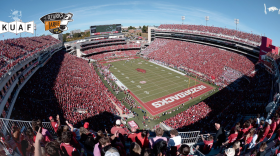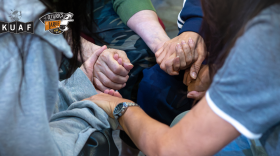AILSA CHANG, HOST:
In Washington, D.C., a team of diplomats from China is getting ready to head home. The diplomats in this case are covered with black and white fur and spend most of their time eating bamboo. Maybe you've already guessed we're talking about giant pandas. From member station WAMU, Jacob Fenston reports.
JACOB FENSTON, BYLINE: President Richard Nixon visited Communist China in February 1972, a historic thaw in the middle of the Cold War. Two months later, Beijing sent a gift back to Washington.
(SOUNDBITE OF ARCHIVED RECORDING)
UNIDENTIFIED PERSON: A pair of giant pandas to the American people.
FENSTON: On a chilly April morning at the National Zoo, a delegation from China presented the bears to First Lady Pat Nixon.
(SOUNDBITE OF ARCHIVED RECORDING)
PAT NIXON: On behalf of the people of the United States...
FENSTON: The pandas, she said, would be enjoyed by millions of Americans. There had been no pandas at all in the U.S. for decades.
(SOUNDBITE OF ARCHIVED RECORDING)
NIXON: I think pandemonium is going to break out right here at the zoo.
FENSTON: She was right. Pandemonium did break out, and it's going strong 51 years later.
MADELINE: See the panda right there?
CHRISTINE MURRAY: I do see him right there. He's so cute, right? Yeah.
FENSTON: Four-year-old Madeline loves pandas. She's at the National Zoo for her birthday wearing a panda costume. Her mom, Christine Murray, says they came down from Pennsylvania to say goodbye. Pandas only exist in the wild in China, so the country has a monopoly on one of the world's cutest animals. Since 1972, China's gifted or loaned pandas to countries across the globe, often coinciding with major trade deals. It's been dubbed panda diplomacy. But now these very popular ambassadors are being recalled.
DENNIS WILDER: I think that this has been a knee-jerk reaction to a very ugly period in U.S.-China relations.
FENSTON: Dennis Wilder is a professor at Georgetown University and a former White House China official. He says the Chinese were angered by Nancy Pelosi's visit to Taiwan last year. Then things soured even more after the U.S. shot down the alleged Chinese spy balloon early this year. It's not surprising, he says, that China would withhold pandas in response.
WILDER: Panda diplomacy has been positive, but panda diplomacy can become punitive panda diplomacy as well.
FENSTON: It's not just the D.C. pandas. Other U.S. zoos have had to send their animals back after leases expired and were not renewed. The last giant pandas in the country are in Atlanta, and they're scheduled to head home early next year. Panda diplomacy appears to have been wildly successful, maybe even too successful, says Elena Songster. She's a history professor at Saint Mary's College of California, and she wrote the book "Panda Nation." In places like D.C., she says, the lovable bears have become entwined with local identity.
ELENA SONGSTER: I think in some ways, people identify the panda as theirs as much as or more than they think of it as something from China.
FENSTON: As the D.C. zoo prepares for the pandas to leave, keeper Mariel Lally shows off one of the crates they'll travel in.
MARIEL LALLY: Right over here on the other side of the stairs. So it is that massive white thing. It's about the...
FENSTON: She's been working on crate training the bears just like you would with a pet. They've gotten used to hanging out in the big metal boxes, especially the female, Mei Xiang.
LALLY: She would just sit in the crate all day if we let her. She doesn't even need a reward when she goes in there at this point. She just wants to sit in there.
FENSTON: Soon, the three pandas will be loaded into a FedEx Boeing 777 freight plane along with more than 200 pounds of bamboo. That's one day's meal for the bears. National Zoo officials say they haven't yet begun talks to get more pandas from China, but they're optimistic panda diplomacy isn't over. In fact, while the panda house is empty, the zoo plans to spend $2.5 million revamping the panda enclosure. They hope sometime soon it will again be filled with cute, bamboo-eating bears. For NPR News, I'm Jacob Fenston.
(SOUNDBITE OF DUA LIPA SONG, "LOVE AGAIN") Transcript provided by NPR, Copyright NPR.
NPR transcripts are created on a rush deadline by an NPR contractor. This text may not be in its final form and may be updated or revised in the future. Accuracy and availability may vary. The authoritative record of NPR’s programming is the audio record.




